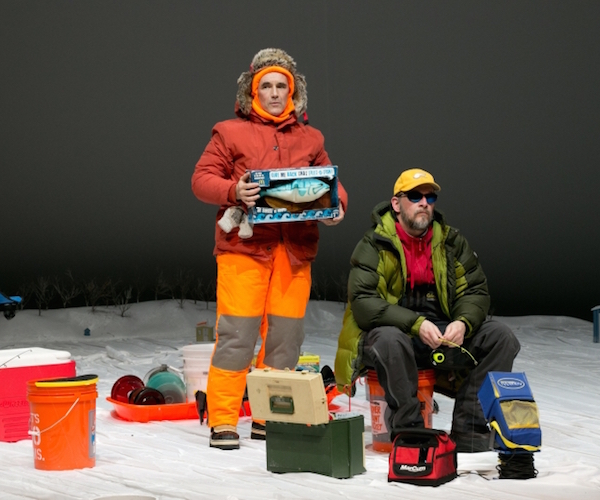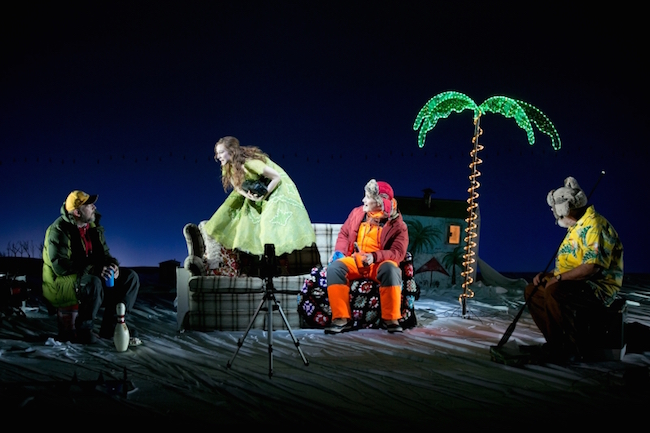Fuse Theater Review: “Nice Fish” — An Amusingly Big Catch
Nice Fish serves up a deliciously droll brand of American existentialism.
Nice Fish by Mark Rylance & Louis Jenkins. Directed by Claire Van Kampen. Staged by the American Repertory Theater at the Loeb Drama Center, Cambridge, MA, through February 7.
Note: A revival of Nice Fish is running in London, from November 16 2016 through January 21 2017 at the Harold Pinter Theatre.

Mark Rylance and Jim Lichtscheidl in the American Repertory Theater staging of “Nice Fish.” Photo: Evgenia Eliseeva.
By Bill Marx
The marketing prowess of American Repertory Theater artistic director Diane Paulus is usually unerring. She knows deep in her entrepreneurial bones that in a culture increasingly dedicated to the competitive fight of attracting the attention of over-stimulated eyeballs, tweets and Google ads are the compact keys to success. We have now reached the point that the rat-a-tat tweets hammered out hourly by companies are — in too many cases — more imaginative than the productions being sold. Mastering the art of instant messaging may be leaving interest in the art of the theater behind.
Regarding Nice Fish, though, the A.R.T.’s Google ads were somewhat misleading: “Fargo meets Waiting for Godot.” Granted, this sort of movie-ad shorthand would make for an amusing parlor game, but it does disservice to just how distinctive, and deliciously droll, the play’s brand of American existentialism is. This wryly amusing piece, created by Mark Rylance and prose poet Louis Jenkins (the script has been drawn from Jenkins’ writing), has neither the bloody noir elements of the Coen brothers or the gaunt skeletal pessimism of Beckett. I was put in mind of the plaintive white bread universalism of Thornton Wilder’s Our Town, though with a sardonic twist. The ice of existence wasn’t so thin in Grover’s Corner.
Yet there’s a similar focus on the rewards and indignities of the everyday, the vagaries of aging, memory, false promises, and boredom, the comic indignities of the trivial when seen under the eye of eternity. There’s no town in Nice Fish and precious few characters: only a couple of male friends fishing out in the ice fields in the hinterlands of Minnesota, musing about life, the fading past, the ephemerality of old girl friends, the joy of making baloney sandwiches, and death. Some cameo appearances interrupt their deadpan revelries: Wayne, an old guy who gives a hilarious pep talk to bait on a hook, Flo, a woman who seems interested in creating some sort of ad-hoc community, and an overzealous DNR man who is a walking talking rule book.
As in Beckett, not much happens, but the day moves along and as a dream-like evening comes on the mischievous comedy of the morning gives way to darker intimations of failed domesticity and mortality. The two guys offer a clear-cut, Odd Couple-esque contrast: Jim Lichtscheidl’s terse Erik is determined to land a fish, his conventional dedication (and impatience with interruptions) set against Mark Rylance’s Ron, a perpetual adolescent who doesn’t know (or care all that much) about fishing, aside for the fact that it is a way to kill time. He likes playing about with — including creating a voice for — a snow man, blares fish-frightening rock music out of his car radio, drops cell phones into the briny deep, and is not adverse to accepting a sauna when Flo saunters by and offers him a chance to dip into some warmth.
Out of a succession of vaudevillian style sketches, zipped up on occasion with surreal hijinks, Rylance, Jenkins, and director Claire Van Kampen build a quirky vision of life that is rooted in the observational (comedy in a Seinfeld-ian key): meditations on the significance of wandering into a room looking for something and then forgetting what it was, joyous memories of making and then biting a hole in the middle of a baloney sandwich, then peering through the opening into a new world. The show’s laughs are genially askew, and the material has the benefit of not overstaying its welcome — at 95 minutes Nice Fish makes its own succinct point about how quickly time needs to pass when humorously fending off the chills of angst.

Jim Lichtscheidl, Kayli Carter, Mark Rylance, and Louis Jenkins in “Nice Fish.” Photo: Evgenia Eliseeva.
The production also proffers some impish performances. The poet himself shows up as Wayne, an aging man, grumpy to the max yet somehow endearing. Bob Davis is tyrannical officialdom personified as a DNR man who pops up from below as well as above the ice, Kayli Carter’s Flo offers loquacious invitations to connection. Lichtscheidl’s Erik supplies a dogged sense of defeat – the actor nimbly clings to persistence. Mark Rylance is as dexterous as ever in his depiction of a man who is going through life clueless. I will never forget the actor when he flounced around in pajamas as a befuddled Hamlet in the American Repertory Theater’s 1991 production of Shakespeare’s tragedy. I didn’t quite buy the notion of such an infantilized prince, but it was a provocative take on the character. Then I saw Rylance on Broadway in 2011’s Jerusalem, where he played macho monster Johnny “Rooster” Byron, a figure who exploded with astonishing bursts of volcanic power. This was a great performance — evidence of his amazing range. In Nice Fish Rylance is obviously having fun in the role of an innocent fool; it is a relaxed, sweet-natured turn that epitomizes the production’s shaggy dog amiability — its playfully quiet absurdity.
If this is absurdity, it’s intimations of life’s futility are more charming than alarming, daffy rather than disturbing. In addition, there’s not much talk about history or society, no mentions of politics or the environment (aside from a quick bow to global warming). Grand passions are scarce, aside from landing the big fish. And when that finally happens the heroic act turns into yet another tragicomic exercise in diminished expectations, the poignant meaningless of the catch. A contrasting view is served up by one of my favorite fishing poems, Bertolt Brecht’s “The Fishing-Tackle,” where “a short bamboo stick bound with cord/ With an iron hook designed/ To snag fishing-nets from the water” keeps the poet in mind “of so many/ Unsolved but not insoluble/ Questions of humanity.”
Bill Marx is the editor-in-chief of The Arts Fuse. For over three decades, he has written about arts and culture for print, broadcast, and online. He has regularly reviewed theater for National Public Radio Station WBUR and The Boston Globe. He created and edited WBUR Online Arts, a cultural webzine that in 2004 won an Online Journalism Award for Specialty Journalism. In 2007 he created The Arts Fuse, an online magazine dedicated to covering arts and culture in Boston and throughout New England.
Tagged: American Repertory Theater, Claire Van Kampen, Louis Jenkins, Mark Rylance


Regarding Godot, I seem to have muddied the waters by mentioning Beckett a second time in the review. Put in the name of any play without a conventional plot. In Beckett, famously, “nothing happens … twice.” There is not that kind of depth here … my last graph is about that — if this is absurdity, it is not deep or dangerous — it doesn’t raise (or complicate) moral and political issues.